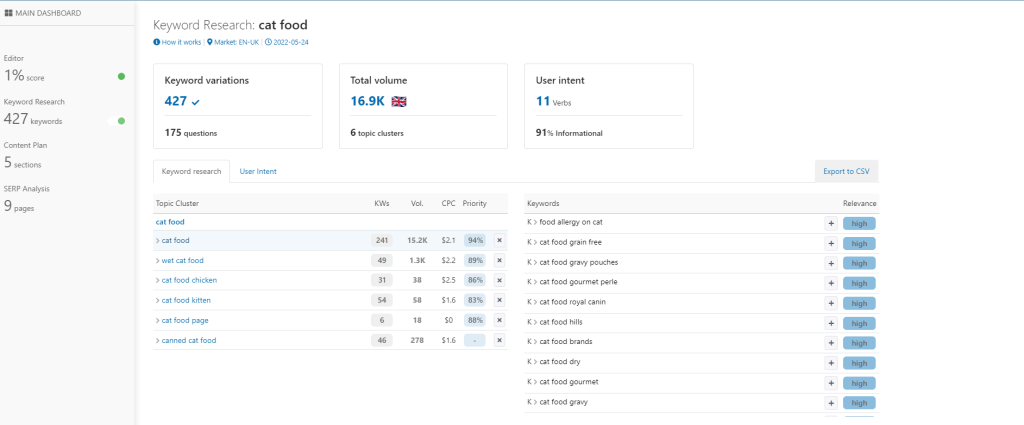
Topical authority refers to the level of expertise and credibility a website, or a piece of content has on a specific topic or subject area. It’s about being recognized by search engines and, more importantly, your audience as a trusted source of information on a particular topic.
From an SEO standpoint, topical authority is crucial. Google and other search engines constantly strive to provide users with the most relevant and high-quality content. Websites that demonstrate topical authority are more likely to rank higher in search engine results pages (SERPs) because they offer comprehensive, in-depth content that satisfies user intent.
Why Does Topical Authority Matter?
Topical authority matters for several reasons:
Improved Rankings: Search engines favor websites that provide comprehensive, in-depth content on specific topics. Becoming a topical authority can improve your chances of ranking higher in SERPs.
Increased Trust: You build trust with your audience when consistently providing valuable, high-quality content on a specific topic. This can lead to higher engagement rates, more shares, and increased brand loyalty.
Competitive Edge: In a saturated digital landscape, topical authority can help you stand out from your competitors. It can be a unique selling proposition that sets you apart.
How to Build Topical Authority?
Building topical authority requires a strategic and consistent approach. Here are some steps to get you started:
Choose Your Topic Wisely: Identify a topic that aligns with your brand, products, or services. It should be something you have expertise in and that your audience is interested in.
Create Comprehensive, High-Quality Content: Once you’ve chosen your topic, create in-depth, high-quality content around it. This could be blog posts, white papers, videos, podcasts, or any other form of content that your audience engages with.
Update Regularly: Topical authority isn’t a one-and-done deal. You need to update your content to stay relevant and authoritative consistently.
Promote Your Content: Use SEO best practices to promote your content. This includes optimizing your content for relevant keywords, building high-quality backlinks, and promoting your content on social media and other channels.
Practical Example of Building Topical Authority
Suppose you aim to enhance the visibility of your articles on protein powder. Merely crafting a single article with the keyword “protein powder” might not suffice to gain a competitive edge in this specialized field.
The reason? The subject of protein powder is vast, and it’s impractical to encapsulate all its aspects within a single article.
To establish your authority on the topic, it’s crucial to delve into every facet of protein, which includes addressing queries like:
- “Understanding the concept of protein.”
- “The role and benefits of protein powder”
- “Identifying the top-rated protein powders.”
- “Guidelines on how to utilize protein powder”
- “The shelf life of protein powder”
- “Utilizing protein powder for weight loss: A how-to guide.”
Tools and Resources for Building Topical Authority
Several tools and resources can help you build and measure your topical authority:
Semrush: This tool tracks your keyword rankings, identifies backlink opportunities, and analyzes your competition.
At Stradiji, we have relied on Semrush for several years to support all our projects. Each project is assigned a Semrush account, and we offer our clients read-only access if they wish to follow the progress. Recently, Semrush introduced a new feature called Keyword Clustering, which we believe will revolutionize our work. This feature provides automatic keyword clustering and mind maps highlighting potential keywords, ranked pages, and easy integration with the writing assistant. With these new tools, we can efficiently map and prioritize keyword content, making our work more accessible and practical.


Keyword Insights: With Keyword Insights, you can take your content marketing to the next level by utilizing cutting-edge artificial intelligence technology. This platform helps you with keyword research, content planning, and creation to boost your search engine rankings.


InLinks: InLinks allows you to create in-depth, entity-orientated topic maps. Using these as a springboard to plan your content will give you a fantastic idea of what to include in your site. I have used it in many projects and find the tool very useful.


Read InLinks: A Tool for Building Topical Authority blog post to learn more about using InLinks to create topical authority.
Ahrefs: Ahrefs is a comprehensive SEO tool that can help you identify relevant topics, track your rankings, and analyze your backlink profile.
Moz: Moz offers a suite of SEO tools, including keyword research, link building, and site audits.
Google Trends: This free tool from Google can help you identify trending topics in your industry.
Google’s E-E-A-T Guidelines: Google’s Experience, Expertise, Authoritativeness, and Trustworthiness (E-E-A-T) guidelines provide a framework for creating high-quality, authoritative content. Google’s Search Quality Evaluator Guidelines are an excellent resource for further understanding YMYL pages and the E-E-A-T framework.
A topical authority is a powerful SEO strategy that can help you improve your search engine rankings, build trust with your audience, and gain a competitive edge. Choosing your topic wisely, creating comprehensive, high-quality content, and using the right tools and resources can establish yourself as a topical authority in your industry.
Remember, building topical authority takes time and consistency. But with the right approach, it can be a game-changer for your SEO strategy. So, start building your topical authority today and watch your SEO efforts flourish.
Learn More
- What Is Topical Authority in SEO & How to Build It
- Topical Authority: The What, Why, and How (Don’t Ignore It)
